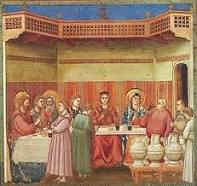 Have you ever watched a make-over program on TV? I’ve watched a few on house make-overs. But recently when I was channel surfing, I was attracted by a young lady’s plea to get her boyfriend to dress appropriately for a wedding. This was one of those make-over shows where a person gets their entire wardrobe revamped. As these shows go, they took him – he seemed to go without protest – to an up-scale clothing store for a new wardrobe that would make him acceptable at the wedding – at least in the eyes of his girlfriend. He watched helplessly as his favorite clothes were thrown in a heap and replaced with more “fashionable items.”
Have you ever watched a make-over program on TV? I’ve watched a few on house make-overs. But recently when I was channel surfing, I was attracted by a young lady’s plea to get her boyfriend to dress appropriately for a wedding. This was one of those make-over shows where a person gets their entire wardrobe revamped. As these shows go, they took him – he seemed to go without protest – to an up-scale clothing store for a new wardrobe that would make him acceptable at the wedding – at least in the eyes of his girlfriend. He watched helplessly as his favorite clothes were thrown in a heap and replaced with more “fashionable items.”
The party in today’s Gospel would have been a highlight in many people’s lives. free food, hobnobbing with people whose names they’d only heard in passing. Why would they not jump at the chance to be a guest at such a fantastic occasion? But you just throw a party yourself and you will quickly figure out that some who say “yes” won’t show up and a goodly number will figure you knew they’d come so they did not really need to RSVP.
The people to whom Jesus was telling this parable understood the absurdity of the situation. They knew that Jesus was not simply telling them a strange story but that he was telling them something about their own lives. He was in essence telling them that they were the invited guests and that they had refused the invitation. They understood that Jesus was telling them that the kingdom of God is open to everyone: to the outcasts and the sinners and to them.
But Jesus doesn’t stop his parable with that. He goes on to say that once the street-people had been invited into the banquet, the king spotted someone who wasn’t properly dressed. When asked why, the man was speechless. The king demanded that he be handcuffed and thrown into the outer darkness. How are we to understand this part of the parable? Why was lack of a certain type of garment such a big deal?
Some may say the king invited everyone so people should come just as they happen to be when they decided to join the banquet. Others argue it means we should be given a special robe at the door of the church to wear during the service. Of course, these answers miss the point. This is a story that has a deeper meaning. Yes, it is a story, but remember parables are earthly stories with heavenly meanings.
I find it intriguing that while the last group brought into the wedding came from the hedgerows and by-ways, the main character was still expected to be wearing a wedding garment. This lets us know, doesn’t it, that we better be ready at all times to come to the wedding. The point, of course, is not what type of clothing covers our nakedness. At some stage in life we’ve all learned that although not the most important thing in life, fashion is not something to be totally ignored either. Just ask anyone who is getting married, or celebrating a jubilee or going to a funeral, if what people wear isn’t of some significance. At one end of the spectrum, there are folks who believe brand name labels are the key to admittance into their coveted social circle. But for others, fashion is just not a big deal at all. They may not even own a full-length mirror.
The wedding garment Jesus was talking about was like a choir cloak that was provided at the door. To the listeners, this guest was one who snubbed social rules, the significance of the occasion and the prestige of being included on the guest list.
Even though everyone is invited into the banquet of the kingdom of heaven, there will be some who simply don’t send back their RSVP card. There will be those who show up but do so without the proper spiritual clothing and are sent away. The reading leaves us with that same probing question we first heard in our mother’s voice: “You’re wearing that?!” We quickly recognized it was not really a question but an order.
Maybe a good place to start re-doing our spiritual wardrobes would be to heed St. Paul’s admonition to the Colossians (3:13): “As God’s chosen people … clothe yourselves with compassion, kindness, humility, gentleness and patience.” Just be sure you’re wearing the proper attire when Jesus says: “Come in, Friend, I’ve saved a seat with your name on it.“
~ Reflection by Sister Roberta Bailey, OSB
Pray for peace in the world and people’s safety; for justice and access to health services; and protection from all forms of violence.








